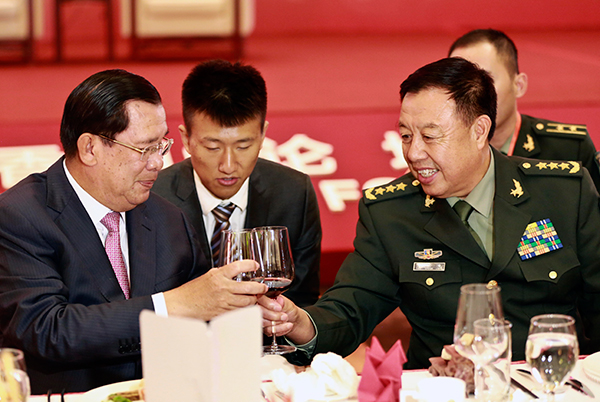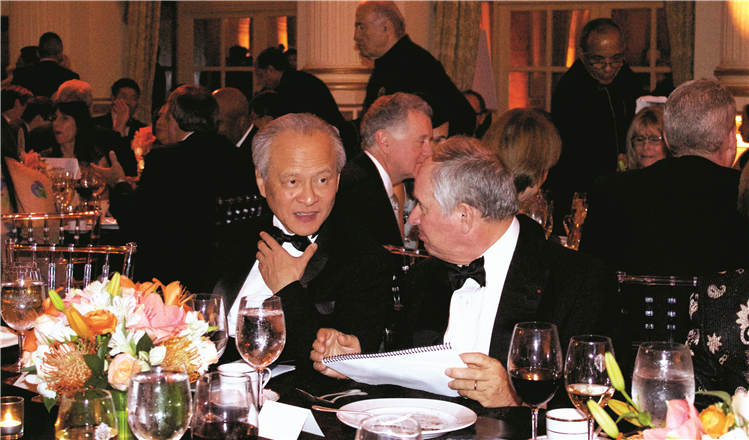China 'will never recklessly resort to the use of force'
Updated: 2015-10-19 07:39
By ZHANG YUNBI(China Daily)
|
||||||||
 |
|
Fan Changlong (right), vice-chairman of the Central Military Commission, and Hun Sen, prime minister of Cambodia, at a welcoming dinner for Xiangshan Forum participants on Friday. FENG YONGBIN/CHINA DAILY |
Vice-Chairman of the Central Military Commission Fan Changlong said China "will never recklessly resort to the use of force" even on issues regarding sovereignty, and China's construction of islands in the South China Sea helps provide better public services to the world.
Fan made the comments while addressing the Sixth Xiangshan Forum over the weekend, a high-end semiofficial gathering hosted by China that involves senior officials and scholars and focuses on Asia-Pacific security.
Several days ago, newly built lighthouses on Huayang Reef and Chigua Reef, where China has garrisons, were officially put into use. Fan said such projects "will not affect freedom of navigation in the South China Sea".
Vice-Foreign Minister Liu Zhenmin said at a reception speech at the gathering on Saturday that China will continue building other facilities with civilian purposes and in the international interest.
"Countries alongside the South China Sea and vessels sailing through the waters will receive better service," Liu said.
As for territorial issues, Fan said China will continue to resolve disputes and differences with directly related parties through friendly consultations. China "has done its utmost effort to avoid unexpected conflicts", Fan said.
At the forum, senior defense officials and scholars called for prioritizing cooperation when distrust and lingering tensions cloud some parts of the region.
Malaysian defense chief Tan Sri Dato' Sri Zulkifeli bin Mohd Zin warned in a Sunday plenary session of the forum: "We must never allow any military conflict in the region ... because it will bring other players into the fray."
He said that in 2014, around 80,000 ships went through the Strait of Malacca, a critical passage, and that corporate activities in the region have amounted to $7 trillion.
Regional stakeholders should "keep the door of talk open" because "cooperation results in a win-win outcome", he said.
Yan Xuetong, dean of the Institute of Modern International Relations at Tsinghua University, suggested that "cooperation could even be started when trust is absent" in some parts of the Asia-Pacific region.
"Don't make the absence of trust an excuse for no cooperation. ... We could embark on preventive cooperation first," he said, referring to a paradigm in which two countries prevent conflicts or accidents from developing between them.
Preventive cooperation between China and the United States has turned out to be a success and could be expanded from a bilateral context to multilateral ones, Yan said.
- US provocations threaten to militarize South China Sea
- Island building not 'militarizes' South China Sea: Foreign Ministry
- US should change tack in South China Sea
- International Recognition of China's Sovereignty over the South China Sea
- China completes construction of two large lighthouses in the South China Sea
- EU offers Turkey cash, closer ties for migration help
- ROK, Japan to hold defense ministers' talks next week
- 5 countries elected as non-permanent members of UN Security Council
- Obama slows pace of US troop withdrawal in Afghanistan
- Democratic rivals back Clinton on emails
- Myanmar gov't signs ceasefire accord with armed groups

 Trump card
Trump card
 Shaolin monks display kung fu skills in London
Shaolin monks display kung fu skills in London
 'Newlyweds' are 'floating' on air in Zhengzhou
'Newlyweds' are 'floating' on air in Zhengzhou
 Buckingham Palace prepares for Xi's visit
Buckingham Palace prepares for Xi's visit
 Shanghai Fashion Week: We COUTURE
Shanghai Fashion Week: We COUTURE
 World's top 10 innovative economies
World's top 10 innovative economies
 Cui: China, US should share global vision
Cui: China, US should share global vision
 Speaking Mandarin attracts Chinese homebuyers in the US
Speaking Mandarin attracts Chinese homebuyers in the US
Most Viewed
Editor's Picks

|

|

|

|

|

|
Today's Top News
Tu first Chinese to win Nobel Prize in Medicine
Huntsman says Sino-US relationship needs common goals
Xi pledges $2 billion to help developing countries
Young people from US look forward to Xi's state visit: Survey
US to accept more refugees than planned
Li calls on State-owned firms to tap more global markets
Apple's iOS App Store suffers first major attack
Japan enacts new security laws to overturn postwar pacifism
US Weekly

|

|







